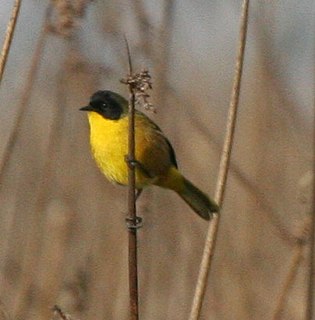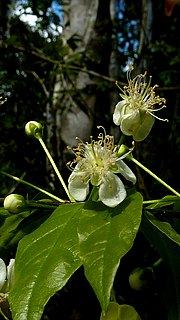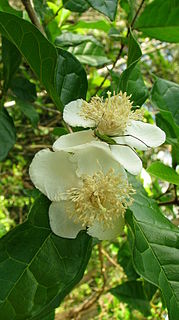
Campomanesia is a genus in the family Myrtaceae described as a genus in 1794. It is native to South America and Trinidad.

Baphia speciosa is a species of legume in the family Fabaceae. It is found only in Zambia.

Streblorrhiza speciosa was a perennial shrub endemic to Phillip Island. A species of legume in the family Fabaceae, and the sole species of the genus Streblorrhiza, it is now presumed extinct.

The splendid poison frog or splendid poison-arrow frog was a species of poison dart frog endemic to the eastern end of Cordillera de Talamanca, western Panama. Its natural habitats are humid lowland and montane forests.

The black-polled yellowthroat is a species of bird in the family Parulidae.

Nehalennia speciosa is a species of damselfly in the family Coenagrionidae. It is found in Austria, Belarus, Belgium, the Czech Republic, Denmark, Estonia, Finland, Germany, Italy, Japan, North Korea, Latvia, Lithuania, Luxembourg, the Netherlands, Poland, Romania, Russia, Slovakia, Sweden, Switzerland, Ukraine, possibly France, and possibly Kazakhstan. Its natural habitats are swamps, freshwater marshes, and open excavations. It is threatened by habitat loss.
Aglaia speciosa is a species of plant in the family Meliaceae. It is found in Indonesia and Malaysia.

Campomanesia aromatica is a species of plant in the family Myrtaceae. The plant is endemic to the Atlantic Forest ecoregion in southeastern Brazil.
Campomanesia espiritosantensis is a species of plant in the family Myrtaceae. The plant is endemic to southeastern Brazil, including in the Atlantic Forest ecoregion.
Campomanesia hirsuta is a species of plant in the family Myrtaceae. The plant is endemic to the Atlantic Forest ecoregion of southeastern Brazil, within Rio de Janeiro state. It is an IUCN Red List Endangered species, threatened by habitat loss.
Campomanesia lundiana, also known as the Rio de Janeiro myrtle, was a species of plant in the family Myrtaceae. Before modern extinction, the plant was endemic to Rio de Janeiro state, within the Atlantic Forest ecoregion in southeastern Brazil.
Campomanesia neriiflora is a species of plant in the family Myrtaceae. It is endemic to Brazil. It is threatened by habitat loss.

Campomanesia phaea is a species of plant in the family Myrtaceae. The plant is endemic to the Atlantic Forest ecoregion in southeastern Brazil. It is found in the states of Paraná, Rio de Janeiro, São Paulo.
Campomanesia prosthecesepala is a species of plant in the family Myrtaceae. The plant is endemic to the Atlantic Forest ecoregion in southeastern Brazil, within Minas Gerais state.
Campomanesia reitziana is a species of plant in the family Myrtaceae. It is endemic to Brazil. It is threatened by habitat loss.
Campomanesia rufa is a species of plant in the family Myrtaceae. It is endemic to Brazil.

Campomanesia viatoris is a species of plant in the family Myrtaceae.
Kraussia speciosa is a species of plant in the family Rubiaceae. It is found in coastal Kenya and Tanzania, where it is associated with the Zanzibar-Inhambane regional mosaic.
Psychotria speciosa is a species of plant in the family Rubiaceae. It is endemic to French Polynesia.
Acropora speciosa is a species of acroporid coral found in the Red Sea, the Gulf of Aden, the southwest and northern Indian Ocean, the central Indo-Pacific, Southeast Asia, Japan, the East China Sea, eastern Australia and the oceanic west and central Pacific Ocean. It occurs in shallow reefs at depths of 2 to 25 metres.









